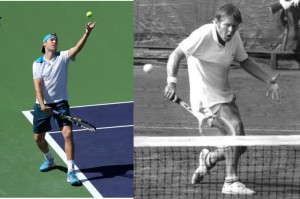By Randy Walker
@TennisPublisher
Jack Sock will play his second career Davis Cup series this week when the United States takes on Australia in Melbourne after achieving a rare feat in his debut series last September.
Sock, the 23-year-old from Nebraska, became only the second American Davis Cup rookie to win two live Davis Cup singles matches since the Davis Cup started in 1900 when he won both of his singles matches in the 3-1 United States win over Uzbekistan in the 2015 Davis Cup Playoff Round in Tashkent. Sock, who beat Farrukh Dustov and Denis Istomin of Uzbekistan in his debut tie, joined Cliff Richey as the only Americans to win two live matches in their debut tie – Richey turning his trick in 1966 in the USA’s opening round match against the Caribbean/West Indies team in Kingston, Jamaica. Richey defeated Richard Russell 6-2, 6-4, 6-0 in his first Davis Cup match on the opening day and after Arthur Ashe and Charlie Pasarell lost to Russell and Lancelot Lumsden 6-4, 7-9, 14-12, 4-6, 6-4 in the doubles, he defeated Lumsden 6-3, 6-3, 6-2 in clinch the United States victory.
“I forgot about that match” said Richey when told of his milestone recently. “I do know that there was no way we were going to lose, even if it was on grass, which was not my best surface.”
While Richey did not remember much of the details of the actual matches from that series, he still has not forgotten his roommate from that week.
“I roomed with Pancho Gonzales,” said Richey of the immense tennis figure at the time, the 1948 and 1949 U.S. singles champion. “I remember he was always reading ‘Car Mechanic’ magazine. He loved cars, especially those fast, funny cars.”
Gonzales was helping the U.S. team as a coach, having played in the mainly barn-storming professional tour for the previous 16 years during the amateur era of the sport. Richey recalled that Gonzales was trying to toughen him up – Richey being a Davis Cup rookie at age 19 – and help him with his penchant for cramping in hot weather by encouraging him not to drink much water to help adjust to his body being depraved of hydration. Richey said that Gonzales cited Native Americans who would run for miles and miles in the hot temperatures of the American Southwest without water as proof that the practice worked.
“He was trying to dry me out,” Richey said. “He was rationing me on water. When I was in bed and I saw that sink in the bathroom dripping water, I was like a rabid dog. I figured Pancho knew what he was taking about since he was one of the greatest players of our generation.”
Richey did not lose a set in his two singles matches that week, but this alternative way of training preached by Gonzales caught up to him at his next event – the French Championships in Paris.
“I made it through that week, somehow, but a week later at the French in Paris, I was up a set and a break on a player named Nikki Spear and I cramped up like a pretzel,” said Richey. “They literally had to carry me off the court on their shoulders. They picked me up like a piece of lumber. That S.O.B. Gonzales almost killed me.”
While Richey is best known for reaching the semifinals of both the U.S. and French Opens, helping the U.S. win the Davis Cup in 1969 and 1970, he has been regarded recently in the mental health community for his work helping people with depression, a condition he suffers from himself. His book “Acing Depression: A Tennis Champion’s Toughest Match” is available for sale here: http://www.amazon.com/dp/0942257669/ref=cm_sw_r_tw_dp_FZ31wb1YHHH6K

